How We Found the Best Vacuum Cleaner
The Best Vacuum Cleaners
Vacuuming. It’s on all of our to-do lists. In fact, you’ll spend an average of 30 minutes to an hour each week vacuuming for the rest of your life, according to Craig Amick, director of commercial development at Electrolux Small Appliances.
Finding the best vacuum cleaners came down to just two things: which ones sucked up the most, and which ones were easiest to haul around. We got our hands on 19 flagship vacuums ranging from $80 to $600, dumped a bunch of junk on the floor, and compared the results.
Top 4 Best Vacuum Cleaners
- Hoover Air Cordless Lift - Best Multi-Surface Vacuum
- Oreck Commercial XL - Best for Carpet
- Samsung VU7000 Motion Sync - Best for Bare Floors
- Bissell CleanView 9595A - Best Budget Pick
The Best Vacuum Cleaners: Summed Up
Hoover Air Cordless Lift
Why We Chose It
Everything you want, with no cord
Our unanimous top pick was Hoover’s Air Cordless for its excellent cleaning power and maneuverability. We were stunned that our only cordless model went straight to the top of the list. Most agree that cordless models aren’t quite there yet in terms of power (Sir James Dyson bought a battery company in 2015, but even he said not to expect battery-operated Dysons “for a few years”), yet this little Hoover defies the trend. It’s everything you want in an upright, and there’s no cord to trip you up.
Two settings, plus a boost
It offers only two settings: carpet or no carpet, plus a “boost” button for more cleaning power, though both settings worked well without boosting. On carpeted floor, the Air Cordless Lift picked up both large and small particles, and never needed more than two passes. On hardwoods, it took another pass or two, but still sucked up every Cheerio and plowed through every pile of sand we put in its path. Then we turned on the boost and bingo: hardwood performance was just as good as carpet.
Converts to canister
The Air Cordless Lift converts to a small canister vacuum with an easily detachable lift-away wand and canister. The parts fit in so seamlessly, we didn’t even notice them at first. It wasn’t much of a noisemaker, either: Coming in at 81.1 decibels, it was on the quieter side of the models we tested (the Orecks, by comparison, were LOUD, rocketing into the high 80s). And, at only 12 pounds, it was among the lightest.
Points to Consider
Odd handling on carpet
It maneuvered around our test furniture without a single collision in a way that can only be described as “zippy.” But this pep did cause some weird handling in large expanses of carpet — it kept trying to maneuver even when we wanted it to keep pointing straight ahead. If you need it to run circles around Grandma’s curio cabinet or your 12-piece dining set, this vacuum’s maneuverability has you covered. But wide-open rooms might be frustrating — if that sounds like your home, we recommend the Oreck Commercial XL, our best carpet pick, or the Samsung VU7000 MotionSync, our pick for hardwood.
Limited charge
While the power of these batteries was rock solid, they can't vacuum all day. Consumer Reports says that each battery (it comes with two, so one charges while the other is in use) lasts only 25 minutes, though the company claims 50 minutes per battery.
Oreck Commercial XL
Ed. Note
Why We Chose It
Massive cleaning power
For a carpet-heavy home, the Oreck is a winner. It has massive cleaning power no matter how big or small the mess. Other than the Hoover, it's the only vacuum we evaluated with edge-cleaning bristles, which are supposed to help pick up debris close to the wall. But we're not convinced these little whiskers do too much — the fact that two of our top picks have them is just a coincidence. (When we tested them out by sprinkling talcum along the perimeter of the room, the bristle-free Bissell performed just as well.)
Minimalist design
Design-wise, it’s pretty commercial, like something you would see in a hotel, and definitely minimalist — we’re talking zero attachments. It has only one setting: on. And its back wheels are located on the underside of the vacuum, rather than on the rear edge, so you can’t tip it back to transport it from one room to the next. Picking it up and just carrying it is your best option — at a featherweight nine pounds, this isn’t a big deal (especially compared to the heaviest vacuum we tested, the Kenmore Progressive, which weighs a burly 23 pounds), but it also isn’t the most convenient. That said, if you’re a sucker for simplicity, the Oreck is zero-fuss and truly powerful.
Easy-to-use handle
If you are arthritic or have limited use of your hands, vacuuming can be a struggle. The Oreck Commercial, however, features a “Helping Hand” handle, which has received an Ease-of-Use Commendation from the Arthritis Foundation. The on/off switch is conveniently located in the handgrip, and works with a light touch.
Points to Consider
Loud
All that vacuuming power comes with the sound to back it up: It roars at well past 85 decibels, the loudest of any vacuum we tested. When compared to another popular vacuum, the Miele Dynamic U1 Twist, the Oreck pushed our sound-level meter far higher.
No bare floor option
On hardwoods, the Oreck cleaned well enough, sucking everything in its path in two passes, and many longtime users say they use it with good results. But neither of the Oreck models we tested has a bare-floor option, which means its brushroll is always rolling; over time, that wear and tear can be damaging to your floors and finishes.
Samsung VU7000 Motion Sync
Why We Chose It
OnePass technology
“One Pass Technology” is one of Bissell’s flagship technologies, and it’s designed to do just what it sounds like: Eat up everything on its initial pass. We don’t know whether Bissell considers “one pass” as just the forward motion, or forward and then backward, but we can tell you how it really works. On the forward pass, it suctions about half of all debris we strewed before it while throwing the rest out behind it. On the backward pass, it picks up everything it tossed, and your floor is 100 percent clean. Is that “One & A Half Pass Technology”? We’re not sure, but bottom line: This best-selling model is a best-seller for a reason. It cleaned way better than we thought it would, and it's really cheap.
Bagless dirt chamber
The 2-liter bagless dirt chamber holds a good amount of debris, and is easy to empty. It has a washable foam tank filter, which saves you the added cost of having to buy replacements. (The Hoover and Samsung have washable filters too).
Points to Consider
Lackluster design
The Bissell won’t win any awards in the design department — it’s a basic and bulky 15 pounds of purple and black plastic. It lacks a molded handle with a grippy texture, so it’s not particularly ergonomic or comfortable; if you get distracted, the handle could slip right out of your hand.
Short hose
Online reviews of the Bissell focused on the hose that allows you to use the machine with the attachments: Most complained that it’s too short and rather stiff. All the suction in the world won’t help you if you can’t reach into crevices and behind the couch. Of course, you can lift the not-inconsiderable 15 pound vacuum up and hold it while you’re working on the cobwebs in the guest room closet, but that gets awkward and can leave you unbalanced and huffing for breath.
A Few Runners-Up to Consider
Dyson Ball Animal Upright
This popular vacuum has great maneuverability on carpet, and only a little less so on bare floor. It’s on the heavier side (around 18 pounds), but quite the cleaner, devouring all of the Cheerio piles we placed before it. One benefit of a Dyson is that the company’s machines feature whole-machine HEPA filtration, so although it’s more costly than any of our winners at $259.99, it could be worth it if you suffer from allergies or have asthma.
The design isn’t for everyone — lots of industrial-looking molding and all its moving parts seem like possible breakage points — but if you like it, you love it, and lots of people do. Plus, we can’t argue with the name: It’s the coolest of the lot.
Kenmore Elite 31150 Pet and Allergy Friendly Upright
We tested two Kenmore models (one in each price category), and you definitely pay for what you get. The vastly superior Elite cleans both carpets and hardwoods in just a few fast passes (unlike the Progressive, which didn’t even come close). It’s the standard big-and-bulky type, and some of its settings are confusing — remember that fancy-sounding dirt sensor?
Overall, the Elite is a solid performer with a HEPA filtration certified by the Asthma and Allergy Foundation of America (like the Samsung VU7000 Motion Sync) and easy-to-use features. (The Progressive’s selectors, in comparison, were so sticky it took two of us together to switch the setting from carpet to bare floor.)
How We Chose the Best Vacuum Cleaners
The best type for most people
Vacuums come in all shapes and sizes — canister, stick, robotic, hand-held, upright — and comparing all of them would be like comparing an SUV with a coupe with a scooter to find the best car. Stick vacuums work great for small spaces and above-the-floor cleaning, while canister vacuums are good for hard-to-reach spots and furniture. For those with too many to-dos, robot vacuums do the job for you.
To narrow the field for this review, we looked at the most popular: uprights. Compared to other models that are designed for specific purposes, upright vacuums are great at quickly removing dust and dirt from large areas of carpet, while also working well on hardwoods and area rugs. They are the most things to most people.
Flagship models at the right price point
Our two benchmarks were under $250 and $250-$600. We nixed any model over $600. Why? Mostly because performance doesn’t improve all that much over that price point — you’re paying for accessories more that cleaning capability. While some people may be really interested in those accessories, they’re mostly a matter of preference.
Within each of the price points, we then dug deeper to see which models stood out. Some vacuums, like the Oreck, have an avid fan base. If a model was hands-down the most talked about, it made our testing list; if a brand didn’t have such a following, we defaulted to its highest-priced model within our two pricing categories — we wanted to put each brand’s top vacuums to the test.
Cleaning power
On medium-pile carpet, then on hardwood, we measured how many passes each vacuum took to thoroughly suck up the mess we made. To test each model’s ability with large particles, we evenly spread sand and Cheerios, then we sprinkled cinnamon and talcum powder to test fine-grain mayhem. The best vacuums sucked everything up in two passes — one forward, one back. The worst could never quite get the floor clean.
Riccar, which regularly garners ecstatic comments, had the least cleaning power of all 19 vacuums we tested. It took so many tries to pick up any sand and Cheerios, we took it apart to make sure we’d assembled it correctly. (We had.)
The Kenmore Elite, by comparison, had great cleaning power, which at first we thought was the result of its “dirt sensor” — it sounded fancy, but turns out it’s just another way to raise or lower the brush depending on carpet height. Gimmicky marketing, but overall a great vacuum.
Maneuverability
We also put each model through an obstacle course: multiple tables and chairs that mimicked the layout of a small room. We required each vacuum to make at least two sharp, 90-degree turns in both directions, and to squeeze through the narrow slots between furniture. If it cornered like it was on rails and wasn’t too heavy to turn on a dime before bumping into something, we were impressed.
One of the key features for increased maneuverability is some form of swiveling joint between the body and the cleaning head; some vacuums do this better than others. Looks were deceiving with the Miele Dynamic U1 Twist: It seemed much bulkier than some of the more slender swivelers, but its patented SwivelNeck was something to behold — it handled each corner like a dream.
The Shark Professional Rotator, on the other hand, looked sleek, but lacked control. (It also came with dangling accessories — so many that there is a special rolling caddy! — that dropped tools all over.)
How to Find the Right Vacuum Cleaner for You
Determine the best type of machine for you
We’ve focused on uprights in this review. They’re the most popular style of vacuum in the U.S. and the best suited for general use. If you’re not sold, here are a few thoughts to ponder as you consider what type of vacuum you might need:
- Uprights: full-sized machines with the most suction for your money. Easier to store than canisters, and generally weighing between 10 and 18 pounds. Cost ranges from $50 up to $1,000. Usually, but not always, come with accessories for cleaning in tight spaces.
- Canisters: Similar to uprights in terms of cost and abilities, but harder to fit into the hall closet. That said, they are easier to use on stairs (if the hose is adequately long) and are generally a bit lighter. Usually come with a range of accessories for cleaning in small spaces.
- Stick: This hybrid looks like a light-duty upright, and that’s what it is. Very easy to use and store. Usually battery-operated and fairly inexpensive at $25-$500. If you’re setting up home in a very cramped urban apartment, a stick could be ideal.
- Robot: Not just a novelty item anymore, and available for as low as $100. Usually under 10 pounds, easily stored, and battery powered. They don’t have the power of a full-sized vacuum, though, and are best used to supplement regular vacuuming.
- Handheld: mini-vacs that range from $20-$250. Five pounds or less. Easy to handle and store like a dream. Excellent for small spaces, and great for cleaning your car or boat. Won’t have the power of a full-sized machine, but a good one is perfect for places that don’t allow for a full-sized machine.
Decide on bagged or bagless
Both designs have been proven to clean well, so one isn’t necessarily better than the other. It’s a matter of preference. Bagless vacuums offer less waste (and save you money since you aren’t buying replacements), but some say you have to empty them more than bagged vacuums. Folks with severe allergies will want to go for a bagged model though: The bags seal, trapping dust and allergens.
Pay special attention to allergies
The best thing to do if you have asthma or allergies is to live without carpet — carpets are notorious for capturing dust, pollen, and other irritating particles. If that’s not a possibility, regular vacuuming becomes even more important.
Second, while everything we found pointed to bagged vacuums as being the better option for allergies, Dr. Rivera-Mariani warns that standard bags easily get tiny tears that allow leakage. If you have a model with bags, replacements with electrostatic properties (these are available for most major vacuums) help keep pesky particles contained. (The electrostatic causes the dust particles to stick together, so they’re less likely to escape.)
Consider a HEPA filter
And last, Dr. Rivera-Mariani strongly recommends a sealed HEPA filter. There are less stringent forms of filtration, like the basic sort all vacuums have (including our Hoover top pick), which absorb dust, but don't capture pollen or pet dander. These are generally fine for most people, but if you're sensitive to irritants, HEPA is the way to go. Dr. Rivera-Mariana goes as far to recommend HEPA filtration even if you have no respiratory issues. Allergies can build up over time, and symptoms may show up suddenly in previously non-allergic individuals.
Vacuum Cleaner FAQ
How much do I need to pay to get a good vacuum cleaner?
One thing that was shocking in our search (but not shocking to anyone who’s ever shopped for a vacuum): the price range on these things. You can find a vacuum for $50 or for $1,000, even though basic performance and quality don’t vary much between mid-range and top-tier models. With the latter, you’re paying more for a lot of bells and whistles — from floor tools that light up to automatic suction control.
With budget models, it’s a total mixed bag. Some truly suck (in the bad way) and others work better than their four-figure counterparts. Case in point: While you sacrifice some oomph and get lower-quality plastic construction, the Bissell CleanView 9595A ($89) outperformed much more expensive models like the SEBO 9807AM Felix 1 ($600) in both cleaning power and ease of use in our hands-on testing. All our top picks came in at the lower end, price-wise, and we stand by them for quality performance at a reasonable cost.
How often should I vacuum?
According to The Carpet and Rug Institute, most households should vacuum once a week, though if you have high foot traffic or pets, up that to a few times per week. Regular vacuuming ensures that you aren’t breathing in all of the accumulated dust and debris that gets kicked up as you move through your home.
Is it worth it to fix a broken vacuum?
Craig Amick from Electrolux told us that retailers across all brands report tons of vacuum returns, mostly due to broken or ailing parts. Don’t return it: Your vacuum is absolutely worth repairing, and most fixes are easy and inexpensive.
While you can still locate the owner’s manual (we know it'll end up getting tossed), figure out the basic stuff: where the belt goes, how to remove the filter, and where a clog could happen. These are the most common vacuum issues, and Amick estimates that first-timers can do simple repairs and replacements in under half an hour. When in doubt: Turn to YouTube for some helpful DIY tutorials or call the customer service phone number usually located on the back or underside of your vacuum.
What do I need to know for vacuum maintenance?
Vacuum maintenance is pretty easy. The most important part is regular filter changes — dirty or clogged filters can result in a reduction of cleaning power. If you have washable filters, make sure to rinse them out two to three times a year. For replacement filters, we got mixed feedback — some say to replace every three months, while Amick suggested every six for typical consumer households. It’s a good thing replacement filters are so easy to come by. They’re readily available on every manufacturer’s website, stores like Target, or the ever-prolific Amazon.
More Household Product Reviews
Keeping the air and surfaces in your home clean and germ-free is one way to create a positive living experience for everyone. Check out some of our other household product reviews to find out all you need to know to keep your homestead sparkling:
Vacuum Cleaner Reviews & Ratings
Aussies continue to rate Miele best for vacuums
When it comes to vacuum cleaners, it’s often the case that you get what you pay for. So, buying a cheap and cheerful vacuum might seem like a great idea at the time, but it could leave you with disappointing results. Then again, you don’t want to be paying more than you need for an appliance that – ultimately – simply sucks up dirt from the floors. The trick is finding the vacuum that ticks both the effectiveness and value for money boxes. So, which brands do Aussies rate highest in both regards? Our customer ratings have the answer.
Once again, we’ve surveyed more than 1,500 households and sought out their opinions on the vacuum cleaners they’ve purchased and used in the last three years. An emerging theme from our reviews and ratings over the years is that typically the more expensive brands are coming up trumps, with Miele topping the ratings for the third year in a row. That’s a fantastic achievement in a competitive market where we’re even seeing the likes of Kmart and ALDI offering solid alternatives to the big name brands. But Aussies who own a Miele vacuum cleaner are clearly the happiest of the lot. Miele scored five stars for effectiveness, ease of use, value for money, ease of emptying and overall customer satisfaction this year.
Best-Rated Vacuum Cleaners
Canstar Blue’s 2019 review of vacuum cleaners saw 10 brands compared, rated in the following order for overall customer satisfaction:
- 1st Miele
- 2nd Dyson
- 3rd LG
- 4th Bosch
- 5th Vax
- 6th Hoover
- 7th Black & Decker
- 8th Electrolux
- 9th Kogan
- 10th Kmart
This year, Dyson, LG, Bosch and Vax achieved four stars overall, with Hoover, Black & Decker, Electrolux, Kogan and Kmart all receiving three stars. Miele was rated best on value for money, followed by Kmart. Dyson was rated best on ease of storage, ahead of Black & Decker and LG, while for battery life, Vax was the pick of the bunch, followed by LG.
These ratings are based on all types of vacuum cleaners – from small handheld vacuums for your car, to large barrel vacuums that specialise in pet hair, plus the latest and greatest handstick vacuum cleaners.
Our review provides a helpful guide as to which vacuum cleaner could be the best bet for your needs and budget. Read on for a little more detail about each brand and what you can get for your money. We’ll also name-drop some other brands that don’t feature in this year’s review but are still worth a mention.
BE IN THE KNOW WITH CANSTAR BLUE
Sign up to our FREE fortnightly consumer newsletter!
By filling in this entry form, you agree to subscribing/resubscribing to our weekly Consumer newsletter and agree to our Privacy Policy.

Top Vacuum Cleaners
Miele
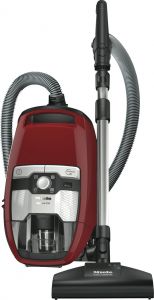
Miele makes cylinder vacuum cleaners (bagged & bag free models), upright vacuums and even an array of robot vacuum cleaners. Its range comes in a variety of sizes and colours to suit most domestic duties and homes. Miele is not generally known for offering gimmicky features, instead focusing on ‘tried and true’ ingenuity and German engineering, with predictably efficient results.
The Miele 10502220 CX1 Blizzard Cat & Dog Bagless Vacuum Cleaner is specifically targeted at pet owners. It features Vortex technology for powerful cleaning and a maintenance free HEPA AirClean Lifetime filter, said to retain up to 99.95% of allergens and fine dust, according to Miele. Miele’s upright vacuum range starts from around $500 and its cylinder models start at about $330, but some cost closer to $1,000, including Miele’s robot vacuums.
Miele cleaned up the competition in this year’s vacuum review, scoring five stars for overall satisfaction and the majority of other categories, except for ease of use and quietness where it received four stars.
Miele’s latest models include:
- Miele Scout RX2 Home Vision Robot vacuum cleaner: $1,699 (RRP)*
- Miele Blizzard CX1 Comfort Bagless cylinder vacuum cleaner: $849 (RRP)*
- Miele Complete C3 Cat & Dog Bagged Vacuum Cleaner: $749 (RRP)*
- Miele Complete C3 Family All-Rounder Graphite Grey Vacuum cleaner: $549 (RRP)*
- Miele Classic C1 Junior vacuum cleaner: $369 (RRP)*
Check Latest Prices at Appliances Online^
Dyson

A vacuum cleaner specialist, Dyson makes a wide range of barrel, upright, handstick and handheld models. Often, categories are further differentiated by what an individual vacuum is said to specialise in. For example, there are Dyson vacuums for allergies, and pet hair. Its barrel vacuums also boast a ‘no-tip’ feature, by using a clever rolling ball instead of wheels.
Dyson is generally seen as a premium brand, with most models costing in excess of $500, while some cost $1,000 or more! Its latest addition – the Dyson V11 – is boasted for powerful suction power and up to 60 minutes of run time, although comes with a retail price tag of $1,249.
Dyson was rated best for ease of storage, and received four stars for overall satisfaction in this year’s review. It also rated four stars for effectiveness, ease of use, battery life and ease of emptying. However, given its premium prices, Dyson scored just three stars in terms of value for money, plus quietness.
Dyson’s vacuum range includes:
- Dyson V11 Absolute Pro Handstick: $1,249 (RRP)*
- Dyson V11 Absolute Handstick: $1,199 (RRP)*
- Dyson Cyclone V10 Animal+ Handstick: $999 (RRP)*
- Dyson Cinetic Big Ball Animal Barrel Vacuum: $899 (RRP)*
- Dyson V7 Trigger Handheld Vacuum: $299 (RRP)*
Check Latest Prices at Appliances Online^
LG
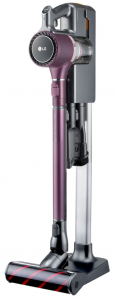
LG specialises in stick and robot vacuums, with a total of 14 models up for grabs at the time of writing. LG’s range focuses on a combination of technical excellence and user friendliness to help make cleaning easy. All units are cordless and battery powered, giving you the freedom of movement.
The LG A9 stick vacuum comes with a dual power pack, which provides up to 40 minutes of run time per battery. It’s boasted for an ergonomic design with a telescopic pipe able to be adjusted to four different lengths as well as its Opti-balanced handle.
Its handstick range isn’t cheap, priced from $699 to $1,899, which might explain why it got just three stars on value for money. However, LG was rated best on battery life, ease of storage and quietness. It received four stars for overall satisfaction as well as ease of use, ease of emptying, plus three stars on effectiveness.
LG’s vacuum range features:
- LG Powerful Robotic Vacuum R9MASTER: $1,899 (RRP)*
- LG Powerful Cordless Handstick A9ULTIMATE: $1,199 (RRP)*
- LG Powerful Cordless Handstick A9ADVANCED: $1,099 (RRP)*
- LG Roboking Turbo Robotic Vacuum VR66800VWP: $849 (RRP)*
- LG Powerful Cordless Handstick A9PETNBED: $699 (RRP)*
Check Vacuum Prices at Appliances Online^
Bosch

Another brand boasting a reputation for German quality, Bosch provides a range of vacuum cleaners, including cordless stick and cylinder vacuums (bagged & bag free units). Some common features you’ll find in its handstick line up are the All Floor High Power Brush, claimed to deliver a thorough clean, plus SensorBagless Technology, stated to continuously monitor the unit’s airflow.
The Bosch Athlet RuntimePlus stick vacuum is boasted for one the longest runtimes around of up to 75 minutes. Other aspects include Bosch’s Smart Sensor technology, which is stated to monitor airflow rates throughout the vacuum to ensure the suction performance doesn’t drop and an LED indicator to notify if the filters are clogged. All of its vacuums can be had for less than $800, with some of its models being priced as low as $299.
Bosch was rated four stars for overall satisfaction as well as for most other rated variables, except on quietness where it was rated three stars.
Bosch’s range includes:
- Bosch Athlet Ultimate BCH732KAU Cordless Vacuum: $799 (RRP)*
- Bosch Relaxx’x Zoo’o ProAnimal BGS5ZOOOAU Bagless Vacuum: $799 (RRP)*
- Bosch In’Genius Zoo’o ProAnimal BGL8ZOOAU Bagged Vacuum: $649 (RRP)*
- Bosch Readyy’y 2-in-1 BBHL2214AU Cordless Vacuum: $399 (RRP)*
- Bosch Free‘e ProPower BGL3PWERAU Bagged Vacuum: $299 (RRP)*
Check Latest Prices at Appliances Online^
Vax

Vax is a specialist in vacuum cleaners and floor care. It makes a fairly concise range of upright, cordless, barrel and handheld vacuums. Many upright models are also cordless, affording you the ability to go wherever the mess and pet hair leads you. Many of Vax’s barrel vacuum cleaners feature big wheels, making them hard to tip over, and some also feature extra accessories to help eliminate pet hair. Vax’s range on the whole can be described as simple, yet powerful.
With a retail price tag of about $300, the Vax Dynamo barrel cleaner is designed with ‘Multi-cyclonic’ technology, stated to separate and trap debris in the dust chamber for reliable suction. For a cordless stick vacuum, the Vax Blade 2 Max (VX82), features a number of accessories and has a run time of up to 45 minutes. The 2000W barrel models are available for less than $100, while most other model types are available for less than $300.
Vax was rated best on battery life but got four stars for overall vacuum satisfaction and for most other categories except for quietness, which was rated three stars.
Vax’s line-up includes:
- Vax VX82 Blade 2 Max Cordless Handstick Vacuum Cleaner: $399 (RRP)*
- Vax VX54 Dynamo Power Total Home Barrel Vacuum Cleaner: $299 (RRP)*
- Vax VX63 Blade Pet Pro Cordless Handstick Vacuum Cleaner: $299 (RRP)*
- Vax VX72 Power 7 Pet Barrel Vacuum Cleaner: $249 (RRP)*
- Vax VX60 Blade Cordless Handstick Vacuum Cleaner: $249 (RRP)*
Check Latest Prices at Appliances Online^
Hoover
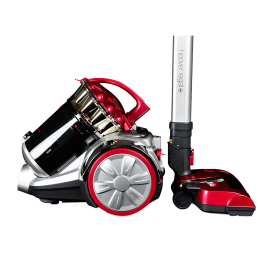
The brand that is now also a verb, Hoover makes a huge variety of bagged and bagless vacuums, plus handheld, handstick and robot vacuums. It even makes a range of cordless upright vacuums powered by lithium-ion batteries. For the really serious vacuum cleaner enthusiasts, there is also a backpack vacuum on offer to make it look like you’re operating a jetpack!
The Hoover Ultra-Light stick vacuum is boasted for its motorised powered head, stated to provide an effective clean and offering up to 20 minutes of run time. It features a motorised power head and multi-cyclonic bagless technology. Hoover prices start from about $50 for the most basic handheld varieties, while the premium bagless models cost up to $1,000.
In this year’s review, Hoover rated three stars for overall satisfaction, effectiveness, ease of use, value for money and quietness, with four stars for battery life, ease of emptying and ease of storage.
Hoover’s range features:
- Hoover Regal Premium Bagless Vacuum: $949 (RRP)*
- Hoover React Advantage Handstick: $699 (RRP)*
- Hoover Quickstick Handstick Vacuum: $299 (RRP)*
- Hoover Tornado Bagless Vacuum: $299 (RRP)*
- Hoover 12V Car Handvac: $49 (RRP)*
Check Vacuum Prices at Appliances Online^
Black & Decker
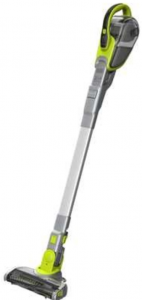
Black & Decker brings forth several cordless handstick vacuums alongside handheld and barrel vacuums at the cheaper end of the spectrum. There are also a number of vacuums specifically designed for pet owners, such as the Black & Decker 27Wh Lithium-ion Cordless Pet Dustbuster Hand Vacuum, which features a specifically designed motorised pet head with rubber tines.
The Black & Decker 45Wh 2-in-1 Cordless Multi-power Allergy Vacuum is designed for allergy sufferers. It features a Dual HEPA filtration system claimed to trap 99.92% of dust particles, plus a run time of up to 60 minutes with a charging time of 6 hours. It’s also equipped with a battery charge indicator and an LED light to illuminate the floor to help you see where you’ve vacuumed. Black & Decker vacuums can be had for around $100 to $400.
The brand was rated five stars for ease of storage but just three stars for overall satisfaction, ease of use and value for money. However, it earned four stars on effectiveness, battery life, ease of emptying and quietness.
Black & Decker’s range include:
- Black & Decker HVFE2150LB-XE Stick Vacuum: $349 (RRP)*
- Black & Decker PD1820L-XE Dustbuster Handheld Vacuum Cleaner: $209 (RRP)*
- Black & Decker PV1820L-XE Handheld Vacuum: $199 (RRP)*
- Black & Decker FEJ520JFSX-XE 2-in-1 HEPA Pet Stick Vacuum: $179 (RRP)*
- Black & Decker VM2040 2000W Compact Bagless Vacuum: $129 (RRP)*
Check Latest Prices at Appliances Online^
Electrolux
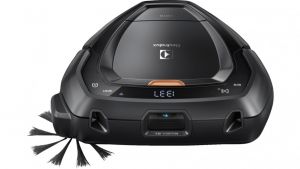
Electrolux makes a wide variety of rechargeable, canister and robotic vacuum cleaners. Most canister models feature powerful motors, as well as specialised areas of expertise, such as pet hair, tough dust, and so on. Also in the range is the ‘Silent Performer’ series, which is claimed to be the quietest series in the Electrolux range. In terms of its rechargeable range, the brand’s 2-in-1 stick models are designed with detachable handheld vacuums, ideal for taking care of small messes.
Its Pure F9 stick vacuum is the latest addition, boasted to combine the performance of a traditional vacuum cleaner with versatility. It provides up to 60 minutes of vacuuming and comes with a 3-in-1 smart tool to help clean all around the home. Models start at about $150 for the handheld varieties and around $250 for the canister vacuums, while the Electrolux PUREi9 Robot vac sits with a retail price tag of about $1,700.
Electrolux was rated three stars for overall vacuum satisfaction in 2019 and the majority of other categories, but scored four stars on effectiveness of clean and ease of use.
Electrolux’s models include:
- Electrolux PI91-5SGM PUREi9 Robotic Vacuum Cleaner: $1,699 (RRP)*
- Electrolux Pure F9 Allergy Vacuum Cleaner: $899 (RRP)*
- Electrolux ZUS4065OR UltraSilencer Vacuum Cleaner: $449 (RRP)*
- Electrolux ZSP4302PP SilentPerformer Cyclonic Animal Bagless Vacuum Cleaner: $299 (RRP)*
- Electrolux ZB6114 Rapido Handheld Vacuum Cleaner: $139 (RRP)*
Check Latest Prices at Appliances Online^
Kogan

Kogan provides plenty of options in the vacuum department, from cordless stick designs to wet and dry units. There are also robot vacuums on offer, including the R10 that provides up to 60 minutes of working time. It features five cleaning modes, including a mopping function and is stated to have a disinfecting UV lamp and HEPA filters.
Its T8 handstick model is stated to offer up to 30 minutes of vacuuming with a 22V battery. It features a motorised hard floor brush head as well as a roller mop brush head for carpets, in addition to a compact brush head for cleaning upholstery. Prices range from $50 to $300 with its stick vacuums being the most expensive in the range.
Kogan was rated three stars for overall satisfaction, effectiveness, ease of emptying and quietness, with four stars for ease of use, value for money and ease of storage.
Kogan’s range features:
- Kogan R50 LaserSmart Robot Vacuum with Mopping Function: $549 (RRP)*
- Kogan T7X Cordless 22V Stick Vacuum Cleaner Clean More Combo: $323 (RRP)*
- Kogan 2-in-1 Cordless 25V Stick Vacuum Cleaner: $119 (RRP)*
- Kogan T6 Corded 500W Stick Vacuum Cleaner: $79 (RRP)*
- Kogan Mighty 2200W Cyclonic Vacuum Cleaner With Turbo Brush: $79 (RRP)*
Check Vacuum Prices at Appliances Online^
Kmart
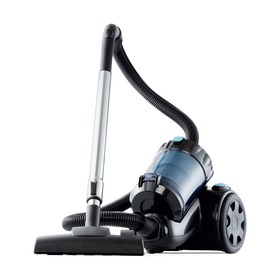
The cheap and cheerful department store specialising in homewares and cheap electronics has a range of vacuums for Aussie consumers to choose from. Kmart has a fairly large range of budget-oriented vacuums, with upright, handheld, bagless barrel and bagged cylinder models currently on offer. It has also branched out into the cordless stick vacuum range, boasting a maximum run time of 25 minutes with its latest addition.
Prices start at just $13 for the wet & dry handheld vac, with most models costing less than $100. Its most expensive vacuum – the cordless stick vacuum with a 6V rechargeable lithium battery – has a price tag of $149. It features a 200W brushless motor and is designed with LED light to help you see under couches and beds. You won’t necessarily sacrifice power with these cheap prices, as many models boast 2000W motors. However, you can’t expect the world, as Kmart vacuums are fairly basic in functionality and light on techy features in comparison to other brands.
Kmart vacuums were rated best on value for money in 2019, but received just three stars for overall satisfaction and all other categories.
Kmart models include:
- Kmart Cordless Stick Vacuum Cleaner: $149 (RRP)*
- Kmart 1200W Upright Vacuum: $85 (RRP)*
- Kmart 2000W Bagless Vacuum: $69 (RRP)*
- Kmart 2-in-1 Corded Stick Vacuum: $29 (RRP)*
- Kmart Wet & Dry Vacuum Cleaner: $13 (RRP)*
Check Vacuum Prices at Appliances Online^
Other brands
Aside from the major brands rated in this year’s review, there are several other brands worthy of your consideration, including:
- Volta^
- Bissell^
- Airflo^
- Neato^
- Ecovacs^
Our 2019 survey of consumers who have recently bought a vacuum cleaner also revealed the following insights:
What to consider when buying a vacuum
Top ratings were in fairly short supply in this year’s review, suggesting that consumers are quite hard to please when it comes to vacuum cleaners. One in four survey respondents (25%) told us they are often disappointed with their vacuum cleaner’s performance, and the same number (25%) regret not spending more on a better model. So, you’ll want to make sure you pick the right type of vacuum for your needs and preferences.
There are pros and cons to different types of vacuum cleaners. Whether it’s not enough battery power from a stick vacuum or constantly tripping over corded barrel models, owning more than one type might be the way to go. If space is at a premium, a stick vacuum is generally easy to store as well as a handheld vacuum that’s ideal for small messes. Canister/barrel models are still the most common and are typically quite versatile with a variety of cleaning heads. Here are some specific factors to consider before buying a new vacuum.
Size

A big factor in how easily a vacuum cleaner is to use and store, size can vary greatly between different models, but it often comes down to a situation of ‘less is more’. From convenient handheld cleaners to uprights and full-sized wheeled models, a compact vacuum cleaner is easier to move around, can clean in tighter spaces and can be stored away with little fuss.
Features
Vacuuming is meant to be fast and efficient, so an appliance that’s easy to operate is essential. This can include features such as intuitive controls, multiple nozzle heads for cleaning different areas, a portable design, and several other factors. Some models also come as a two in one pack, giving you the ability to vacuum with a full sized vacuum and detach a handheld vacuum for smaller messes.
Noise
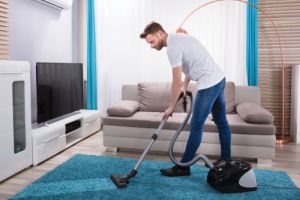
You’d think a cyclonic vacuum cleaner would be inherently noisy, especially with the sucking power available on newer models. In spite of this, many vacuum brands have committed to reducing the noise produced by their appliances, with some impressive results. When doing your research, make sure to check out the vacuum’s noise emission, so that you don’t end up waking up your neighbours on a Saturday morning.
Price
Nearly half of our respondents told us that their most important consideration when buying a vacuum was the price, and value for money is certainly a big factor when buying a vacuum, especially considering most had their previous vacuum for over six years.
When asked about the biggest deciding factor in the purchase of a new vacuum cleaner, consumers said:
- Price: 48%
- Special features: 16%
- Energy efficiency: 14%
- Design/appearance: 11%
When deciding which type of vacuum is the best for your home and family, give some thought to your vacuuming requirements (i.e. how much space do you need to cover) and any specific circumstances or requirements, such as family members with allergies, or pets that have a tendency to shed lots of hair. You’ll likely need to spend several hundred dollars on a top-of-the-line model, which should last you several years, or you can pay less than $50 for a vacuum that – in all probability – will have a fairly modest life expectancy. You generally get what you pay for with vacuum cleaners, so choose wisely.






Không có nhận xét nào:
Đăng nhận xét